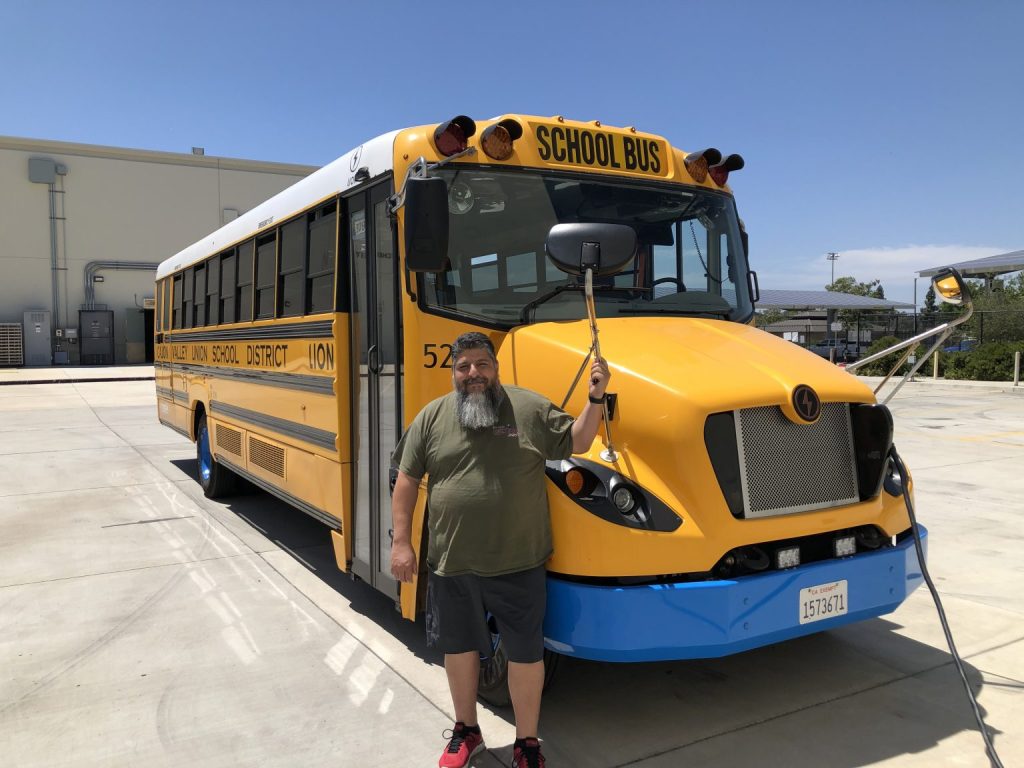Feb 11, 2022
Do Electric School Buses Have a Long Enough Range to be Practical?

Juan Noriega, a veteran driver for the Cajon Valley Union School District just north of San Diego, was excited about getting his first electric school bus “but very worried about how long the batteries would last. That was my main concern, because if the battery was to run out, I would be concerned about the wellbeing of the students.”
He was right to worry. Until fairly recently, batteries weren’t big enough to run a school bus for its full route on electric power without having to stop and recharge mid-route, which would be impractical.
However, in the last five years, batteries have gotten both more powerful and cheaper, with one electric bus on a test conducted in Indiana setting a distance record by driving more than 1,100 miles on a single charge. The test shows that in the future, battery technology can give electric vehicles that are commercially available a range that meets and even greatly exceeds the range of vehicles that run on gasoline or diesel fuel.
For now, the average electric school bus can now run 100 miles or more when fully charged. This means that battery systems in electric school buses boast enough capacity to cover the vast majority of school buses routes on a single charge, a full 90% of routes, according to bus manufacturers. And as battery capacity increases, in the near future electric buses will have enough range on a single charge to cover nearly every school bus route.
Cleaner, Healthier, Cheaper to Run
Parents and students are asking their schools to start transitioning to all-electric bus fleets for a good reason. The benefit to the health of schoolchildren is priceless. The air inside a traditional diesel bus can be up to 12 times more polluted than the air outside, putting both kids and drivers at risk for asthma, cancer and more health ailments.
Transportation managers also like electric buses because they can save schools money on maintenance over diesel buses. Because electric buses have fewer moving parts requiring regular maintenance, Tim Shannon, transportation director of the Twin Rivers Unified School District north of Sacramento that has been operating more than two dozen electric buses since 2017, estimates that the electric buses’ maintenance costs are also 60-80 percent less than his other buses.
And as benefit to society, switching all of the nation’s school buses to electric would reduce the emissions equivalent to taking over a million cars off the road.
With transportation being the largest contributor of US greenhouse gas emissions, it is no wonder that the federal government has started to push for big changes in our transportation system, including setting carbon emissions standards for passenger cars and trucks, and importantly, school buses.
Finally, for more sophisticated electricity customers, electric buses with bi-directional charging—that is, bus batteries can absorb power when they’re plugged in and then later those same batteries can send energy out when it’s needed for other uses through the same plug—can be used as batteries on wheels to store energy.
When buses are idle during the summer, schools can make money storing power from the electric grid when it’s cheap and then selling it back to their utility when high demand makes that power more expensive. Schools can also use buses as backup power for their own campuses, which can be crucial for schools that serve as emergency shelters.
Quieter Ride a Bonus to Drivers and Students
Because electric buses run much more quietly than diesel buses, kids don’t have to shout to talk to each other. It’s easier for the kids to hear the bus driver too when he or she talks to them. Overall, quiet buses lead to quieter and calmer kids who are better behaved. This is a fringe benefit of electric school buses that bus drivers appreciate.
When asked what he liked best about his new electric ride, driver Juan Noriega had no trouble replying:
Quietness. Definitely. With that said, we do have a small noise it makes on purpose for 0-15 miles per hour so people know we’re there. It’s a fun jingle, so everyone jokes that the electric school buses are like an ice cream truck. The noise factor makes a big difference. Diesel is just so loud and starting up close to a neighborhood at 5:30 a.m. with 40 buses turning on would negatively impact the community. Now we have fewer community concerns and complaints, as electric buses make no sound to start.
Juan Noriega, Bus Driver, Cajon Valley Union School District, California
Noriega says that students with learning disabilities especially appreciate the quieter environment of an electric school bus.
Secure Futures has been helping schools go solar on campus with no upfront cost for more than a decade. Now we’re helping schools get electric buses and then run them on clean solar power. If you or someone you know is curious about whether their school is a good candidate for EV school buses or solar power, we’re happy to talk. Just contact us.